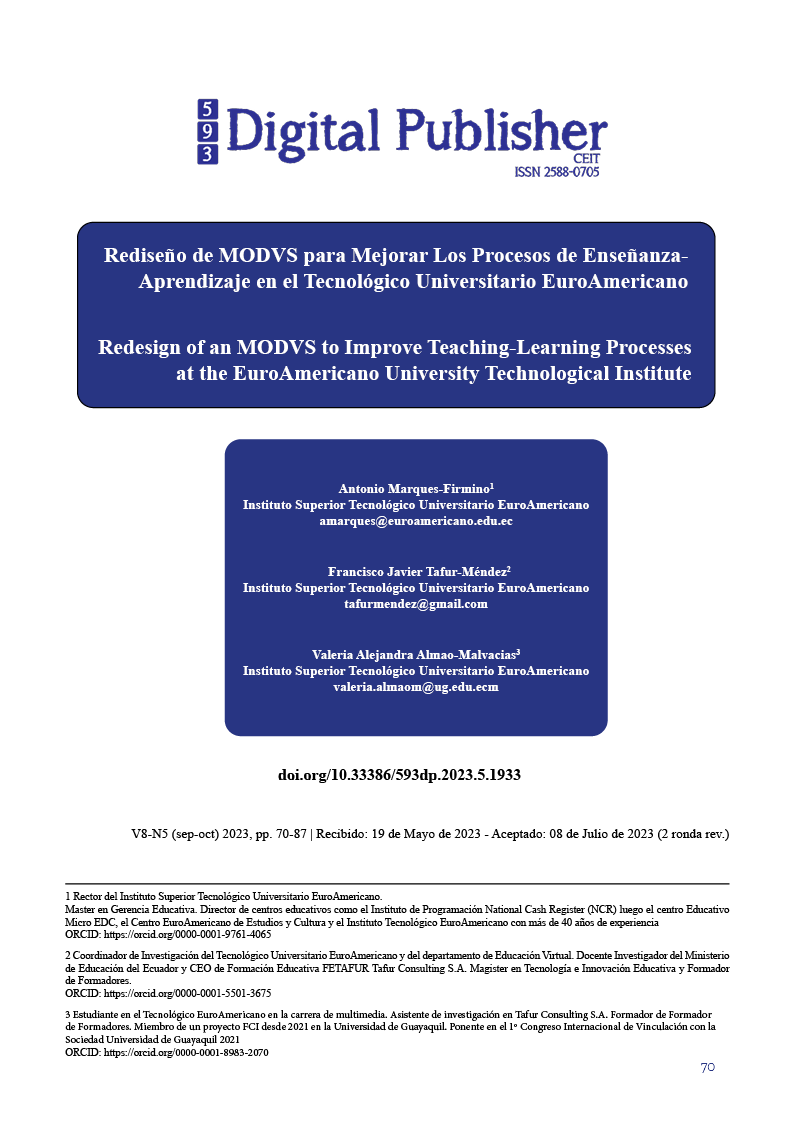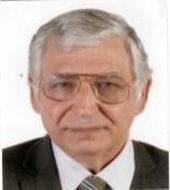Redesign of an MODVS to Improve Teaching-Learning Processes at the EuroAmericano University Technological Institute
Main Article Content
Abstract
Integrating technology in education through virtual learning environments can improve the learning experience when updates are applied according to the needs of the educational community. The new technological changes have had an important effect on human activity in general, which implies that new strategies, tools and resources must be used to adapt in the educational field. For this reason, the opinions and needs of the academic community regarding the virtual platform of the EuroAmerican University Technological Institute were evaluated through surveys, literature corresponding to the subject, and statistical data collected by the platform. It was determined how their functions can be improved for the benefit of the educational community. Although the MODVS platform is well received, areas for improvement in usability, design, organization and content presentation were identified. The need to develop new forms of communication between students and teachers within the platform is also highlighted. In addition, it is pointed out that improvements in the platform not only benefit online students, but also have a significant impact on the effectiveness of teaching and administration in the learning environment in general. Therefore, improving the online learning platform is an investment that benefits the entire educational community and can have a lasting impact on the quality of education in general.
Downloads
Article Details

This work is licensed under a Creative Commons Attribution-NonCommercial-ShareAlike 4.0 International License.
1. Derechos de autor
Las obras que se publican en 593 Digital Publisher CEIT están sujetas a los siguientes términos:
1.1. 593 Digital Publisher CEIT, conserva los derechos patrimoniales (copyright) de las obras publicadas, favorece y permite la reutilización de las mismas bajo la licencia Licencia Creative Commons 4.0 de Reconocimiento-NoComercial-CompartirIgual 4.0, por lo cual se pueden copiar, usar, difundir, transmitir y exponer públicamente, siempre que:
1.1.a. Se cite la autoría y fuente original de su publicación (revista, editorial, URL).
1.1.b. No se usen para fines comerciales u onerosos.
1.1.c. Se mencione la existencia y especificaciones de esta licencia de uso.
References
Balmaceda Castro, I., Salgado, C. H., Peralta, M., Sánchez, A., Fernández, M., Magaquian, J., & Fuentes, N. (2019). Experiencia de usuario en plataforma virtual de aprendizaje. In XXI Workshop de Investigadores en Ciencias de la Computación (WICC 2019, Universidad Nacional de San Juan).
Barros Morales, Roosvelt, Rodríguez Domínguez, Luisa de los Ángeles, & Barros Bastida, Carlos Isaa. (2015). El juego del cuarenta, una opción para la enseñanza de las matemáticas y las ciencias sociales en Ecuador. Revista Universidad y Sociedad, 7(2), 137-144.
Consejo de Aseguramiento de la Calidad de la Educación Superior (CACES). (2021). Modelo de Evaluación Externa 2024 con fines de acreditación para los Institutos Superiores, Técnicos y Tecnológicos. Quito, Pichincha, Ecuador.
Contreras-Castillo, J., Baron-Ramirez, N., Acosta-Diaz, R., Guerrero-Ibañez, A., Figueroa-Perez, J., & Arce-García, A. (2015, November). Gamificación en Plataformas Educativas. In Memorias del XXI Congreso Internacional sobre Educación Bimodal. Medellín Colombia (pp. 25-27).
Díaz, L., Muñoz, L. F. M., & Santos-Pastor, M. (2019). Gamificación en Educación Física: un análisis sistemático de fuentes documentales. Riccafd: Revista Iberoamericana de Ciencias de la Actividad Física y el Deporte, 8(1), 110-124.
Fernández-Lozano, J., Bonachea, J., Morellón, M., & Remondo, J. (2020). Un “pasapalabra” para el aprendizaje de conceptos geológicos. Enseñanza de las Ciencias de la Tierra, 28(1), 50-59.
Fuentes, E. M., Molada, R. M. P., & Navarrete, J. H. (2019). Estudio cualitativo sobre el uso de la gamificación en Educación Superior para promover la motivación en el alumnado. Aula de encuentro, 21(2), 5-26.
García, I. (2019). Escape Room como propuesta de gamificación en educación. Revista Educativa Hekademos, (27), 71-79.
González, C. V. (2020). Herramientas TIC para la gamificación en Educación Física. Edutec. Revista Electrónica De Tecnología Educativa, (71), 67-83.
Orihuela Arredondo, P. (2019). La gamificación como estrategia de enseñanza en docentes de inglés para fomentar el desarrollo de habilidades orales y escritas en alumnos de 9 a 12 años de un instituto de idiomas de Lima.
Ouariachi, T., Olvera-Lobo, M. D., & Gutiérrez-Pérez, J. (2017). Evaluación de juegos online para la enseñanza y aprendizaje del cambio climático. Enseñanza de las ciencias: revista de investigación y experiencias didácticas, 35(1), 193-214.
Paladines, L. J. G., & Mediavilla, C. M. Á. (2021). Gamificación como estrategia de motivación en el proceso de enseñanza y aprendizaje. Revista Arbitrada Interdisciplinaria Koinonía, 6(3), 329-349.
Palomino, M. D. C. P. (2021). Implicaciones de la gamificación en Educación Superior: una revisión sistemática sobre la percepción del estudiante. Revista de Investigación Educativa, 39(1), 169-188.
Rodríguez, C. A. C. (2018). Gamificación en educación superior: experiencia innovadora para motivar estudiantes y dinamizar contenidos en el aula. EDUTEC. Revista electrónica de tecnología educativa, (63), 29-41.
Ruiz, J. A., Mintz, S., & Leipzig, L. (2021). The impact of online learning on students’ course outcomes: Evidence from a large community college system. Journal of Higher Education, 92(2), 267-293. https://doi.org/10.1016/j.econedurev.2013.08.001
Torres-Toukoumidis, A., & Romero-Rodríguez, L. M. (2018). Aprender jugando. La gamificación en el aula. Educar para los nuevos medios, 61-72.
Videnovik, M., Bogdanova, A. M., & Trajkovik, V. (2018). Serious games evaluation methodology. In Proceedings of ICERI2018 Conference 12th-14th November
Villarroel, R., Santa María, H., Quispe, V., & Ventosilla, D. (2021). La gamificación como respuesta desafiante para motivar las clases en educación secundaria en el contexto de COVID-19. Revista Innova Educación, 3(1), 6-19.
Wang, Q., Chen, L., & Liang, Y. (2019). Research on the impact of learning management systems on teaching and learning effectiveness in higher education. Journal of Educational Technology Development and Exchange, 12(2), 39-48. https://www.researchgate.net/publication/331702051_Research_on_the_Impact_of_Learning_Management_Systems_on_Teaching_and_Learning_Effectiveness_in_Higher_Education
Werbach, K., & Hunter, D. (2015). The gamification toolkit: dynamics, mechanics, and components for the win. University of Pennsylvania Press.




